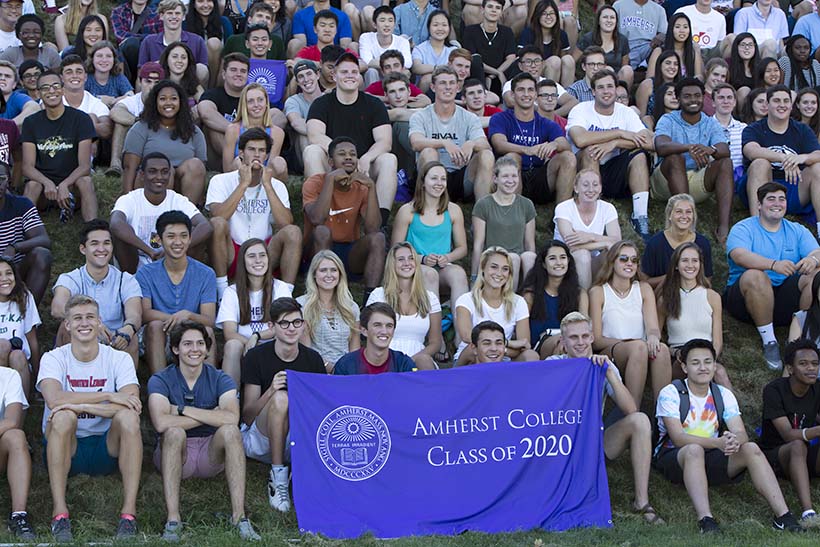Amherst College a Co-founder of National Alliance to Enroll Lower-income Students

Amherst, MASS. -- Amherst College is among 30 leading colleges and universities forming a new initiative to substantially increase the number of talented low- and moderate-income students at America’s top-performing undergraduate institutions with the highest graduation rates.
The American Talent Initiative (ATI), supported by Bloomberg Philanthropies, has brought together a diverse group of public and private institutions which share Amherst College’s long-standing commitment to providing access to higher education. Members of the ATI are enhancing their own efforts to recruit and support lower-income students, learn from each other, and contribute to research that will help other colleges and universities expand opportunity.
(See below for a list of the 30 founding members.)
This initiative is consistent with Amherst’s historic reputation as one of the few truly need-blind colleges in the nation. The College admits students without regard to financial aid, and each admitted student is guaranteed financial aid equal to financial need. The College’s financial aid packages are consistently among the most generous in the nation, and among its peer universities and colleges Amherst has the most economic diversity.
At Amherst, 58 percent of students receive need-based financial aid, 23 percent receive Pell Grants and 17 percent are the first members of their families to attend college. The average annual financial aid package is more than $50,000.
By 2025 the members of the American Talent Initiative intend to attract, enroll, and graduate 50,000 additional high-achieving, lower-income students at 270 colleges and universities with graduation rates of 70 percent or higher. According to the most recent federal data available, there are around 430,000 lower-income students enrolled at these 270 institutions. ATI intends to increase that number to 480,000 over the next decade.
Colleges and universities participating in theAmerican Talent Initiative will further the national goal of developing more talent from every American neighborhood through:
- Developing more robust recruitment of students from diverse socio-economic backgrounds
- Making need-based financial aid a priority
- Implementing proven practices to enroll and keep lower-income students that are admitted
- Minimizing or eliminating gaps in progression and graduation rates
In the mid-20th century, the nation invested higher education for its citizens, opening access through the G.I. Bill, the Higher Education Act and Civil Rights Act. Today, that degree is more critical than ever, and it’s incumbent upon educational institutions of all types to ensure that talented students from every part of society have access to an excellent education.
Research shows that when high-achieving, lower-income students attend these institutions, they graduate at higher rates, and access to those institutions provides them with a much greater chance of attaining leadership positions and opportunity throughout their lives. Yet in each graduating high school class, there are at least 12,500 lower-income young people with outstanding academic credentials who do not enroll in an institution where at least 70 percent of students graduate.
These students have earned the opportunity these schools offer, but for a variety of reasons—including a lack of information about their options, confusion about costs, and inadequate financial aid offers—many of them simply lack access. The American Talent Initiative seeks to ensure that these “missing” students have a path to attend and thrive at the institutions with the highest-graduation rates and best track records for post-graduate success.
“If we're serious about promoting social mobility in America, we need to ensure that every qualified high school student in the US has an opportunity to attend college. I'm so glad that so many great colleges and universities have stepped up today and committed themselves towards that goal. This is a vital first step towards creating a more meritocratic society," said Michael R. Bloomberg, founder of Bloomberg Philanthropies and three-term Mayor of New York City.
This initiative is co-managed by the Aspen Institute’s College Excellence Program (www.aspeninstitute.org/college-excellence) and Ithaka S+R (www.sr.ithaka.org) and funded with an initial $1.7 million, multi-year grant from Bloomberg Philanthropies. Grant funding will be used for best-practice research and dissemination, convenings of college presidents and staff, and data analysis and reporting.
Participating Institutions
Amherst College
Bates College
Dartmouth College
Davidson College
Duke University
Franklin & Marshall College
Georgetown University
Georgia Institute of Technology
Harvard University
Johns Hopkins University
Lehigh University
Pomona College
Princeton University
Rice University
Spelman College
Stanford University
The Ohio State University
University of California, Berkeley
University of California, Los Angeles
University of Maryland, College Park
University of Michigan – Ann Arbor
University of North Carolina at Chapel Hill
University of Richmond
University of Texas at Austin
University of Washington
Vanderbilt University
Vassar College
Washington University in St. Louis
Williams College
Yale University